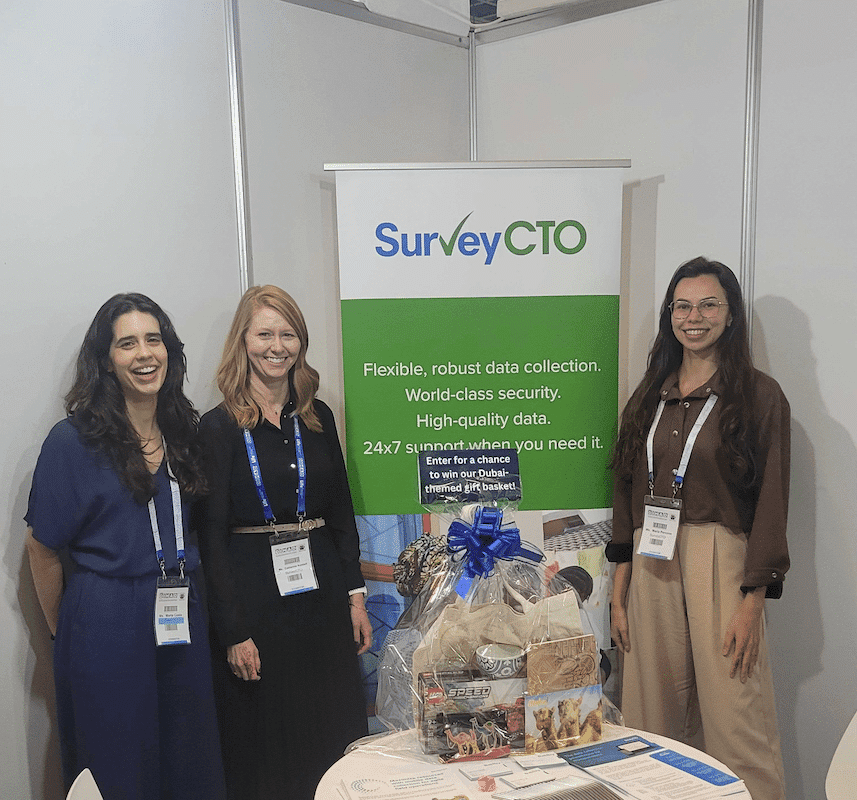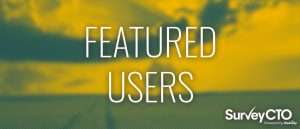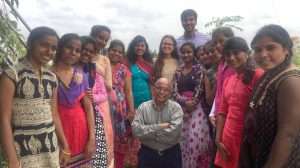Reflecting on digital data collection for humanitarian aid after DIHAD
From April 29 – May 1, Team SurveyCTO members Maria Pervova, Catherine Kendall, and Marta Costa gathered in Dubai to be a part of our first time at the Dubai Humanitarian Aid Conference (DIHAD).
Created in 2004 to become the world’s leading humanitarian conference, DIHAD takes place each year at the Dubai World Trade Centre. This leading event for the humanitarian aid sector brings together global organizations and leaders for workshops, panels, networking, learning, and more.
This year’s theme, “Humanitarian Aid and Development in a Polarised World,” focused on solutions to crises brought on by increasing global polarization, addressing how divisions can complicate humanitarian efforts and how innovation and collaboration can help us overcome these barriers.
From the moment Team SurveyCTO learned about DIHAD, we knew we wanted to explore this new-to-us conference and get the opportunity to connect with changemakers from new parts of the world. So we did: we became booth hosts at DIHAD, sending three team members to showcase SurveyCTO, talk about digital data collection, meet new organizations, attend sessions and workshops on humanitarian action, and enjoy some team building!
Following the conference, Maria, Catherine, and Marta sat down together to record a special episode of Survey & Beyond: The Data Collection podcast, where they reflected on their impressions of DIHAD and what they learned about the state of digital data collection for humanitarian aid in 2025.
Below, you can find snapshots and highlights from that episode. For the full conversation, check out the podcast!
What stood out to us as a team
At DIHAD, we met with leading organizations working in humanitarian action. We learned about their current data collection challenges, and strategized with them on how to make their data collection better than ever. We also attended conference sessions and workshops that took deep dives into a variety of humanitarian topics.
Here are a few of our higher-level takeaways:
- Many organizations are still using paper forms.
Despite the prevalence of data collection platforms like SurveyCTO and other open-source tools, we discovered that many organizations are still using paper forms. This can happen due to many reasons, including resource constraints, different levels of comfort with technology, and organizational hesitance to invest in digital tools. While we understand all these reasons, we also love to advocate for going digital with data collection as a way to get better data and ultimately drive greater impact. With this in mind, we leaned into conversations with organizations that still heavily rely on low-tech methods to learn more about ways to overcome digital barriers. - Data collection as a part of humanitarian aid can feel like an uphill battle. Organizations are working hard to make a difference while building data systems and keeping sensitive information private. Many organizations at DIHAD are serving people in incredibly difficult and tragic circumstances around the world. The dedication, endurance, and compassion that it takes to sustain that kind of work over time made a deep impression on us.

3. Organizations that have transitioned to digital solutions are spending a great deal of time and effort in creating and maintaining in-house data systems.
While we understand the desire for custom systems and applications, we also know this takes enormous resources from organizations and their IT teams. It can also make getting ready for interoperability more challenging than it should be. Fortunately, there are alternatives to this approach–read Maria’s reflections to learn more!
Each team member has a different background and brought their own unique perspective to the conference and the issues it raised. Read their most compelling takeaways below:
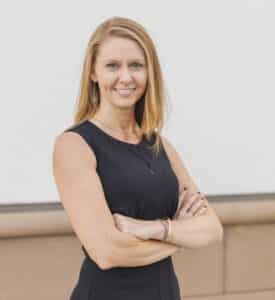
Associate Account Executive Catherine Kendall
Get in touch on LinkedIn.
DIHAD helped me see how SurveyCTO can make a huge impact in this space. Volunteers, these organizations, they’re going into areas for one reason, and that’s to help the people there. And if they’re having to write everything down on paper, or put everything in Excel, or trying to track all this data manually, it actually can become an undue burden that prevents them from doing what they want to do. So I loved having conversations with so many organizations and talking about how digitizing their processes can make things easier. Imagine a doctor coming to volunteer. If they can simply input data into SurveyCTO, they can then focus on the care that they are giving. And so being able to partner with organizations in that way is really exciting. We have a simple solution for complex problems: we can help you focus on what you do, and what you want to do, which is serving others and serving communities and helping them become resilient.
Imagine a doctor coming to volunteer. If they can simply input data into SurveyCTO, they can then focus on the care that they are giving. And so being able to partner with organizations in that way is really exciting. We have a simple solution for complex problems: we can help you focus on what you do, and what you want to do, which is serving others and serving communities and helping them become resilient.
Catherine Kendall

Senior Product Specialist and Survey & Beyond host Marta Costa
Get in touch on LinkedIn.
From my conversations, my general feeling is that now people talk a lot about technology, more than ever before, and I do think there is a general sense that people can leverage technology to become more efficient and to provide better services. But I think there is still a gap between people understanding their data needs, and how that translates into how technology can help them succeed. Also, I’ve noticed the importance of people understanding interoperability, and having tech stacks. Sometimes they are trying to build something that does it all, right? And I think it’s just so important for people to understand how flexible and how leveraging it could be to think about technology in the way where you can interoperate with different systems, different softwares that have different purposes, and different strengths.
Marta Costa
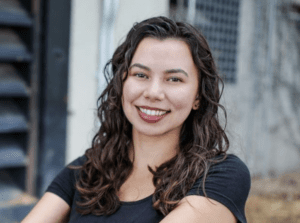
Business Development Manager Maria Pervova
Get in touch on LinkedIn.
The conference got me thinking, “What is innovation?” Innovation is really the process of developing new ideas, methods or technologies, solving new problems, or potentially, solving problems in novel ways. And something that I have been noticing is that sometimes, people are working on solving the same problems.
Many iNGOs tend to have the same problems, and they often have excellent, incredible IT teams building custom solutions. And sometimes, we’ve had conversations—especially at DIHAD—where I have come across IT teams that have built solutions for features that SurveyCTO actually has! For example, automated quality checks for managing your data quality, being alerted anytime a submission comes in that’s out of a range. So I was really excited to have conversations letting people know that we have some solutions for these problems, which could then let IT teams innovate further and be off on their way having more time and energy to solve problems that haven’t yet been solved!
Maria Pervova
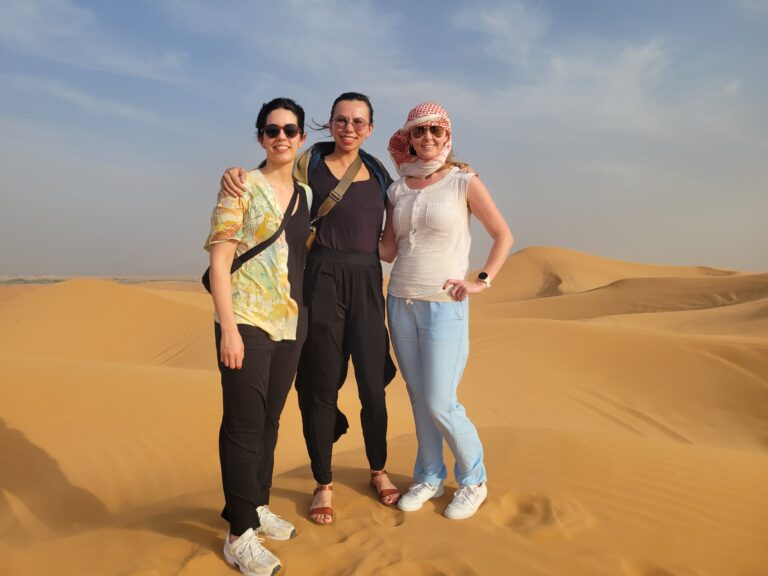
Learn more about our team.
Using SurveyCTO for humanitarian aid
More than anything, we came away from DIHAD with a renewed enthusiasm for how digital data collection tools make humanitarian aid better, faster and more effective–and we want to get the word out to as many humanitarian aid organizations as we can!
If you work in crisis zones taking humanitarian action on behalf of vulnerable people and keep track of that work through forms, spreadsheets, or another data collection platform, you should know that SurveyCTO was built for you.
Since our inception, we’ve been meeting the needs of organizations working with vulnerable people in difficult areas with our best-in-class security, offline surveys, and user-friendly form design tools.
But don’t just take our word for it. Read how:
- Humanity & Inclusion uses SurveyCTO for managing field operations in refugee communities.
- Oxfam used SurveyCTO to build a reliable offline feedback & complaint mechanism, then scaled it to more than 12 countries.
- The Clinton Health Access Initiative (CHAI) has long used SurveyCTO to manage the delivery of essential medicines across Africa.
Get more details on how you can join these leading organizations and power up your data practices for humanitarian action here:
👉🏻 Use SurveyCTO for ethical, secure data collection in humanitarian aid
👉🏻 Explore our recommendations for data collection in humanitarian aid
About SurveyCTO
SurveyCTO is the easiest to use and most secure data collection platform built for data collection professionals, especially those in offline settings. We support professionals working in data collection and management in international development, humanitarian aid, global health, market research, agriculture, and many more. Want to learn how you can go digital at your organization? Start a free trial or request a demo through the buttons below today.

